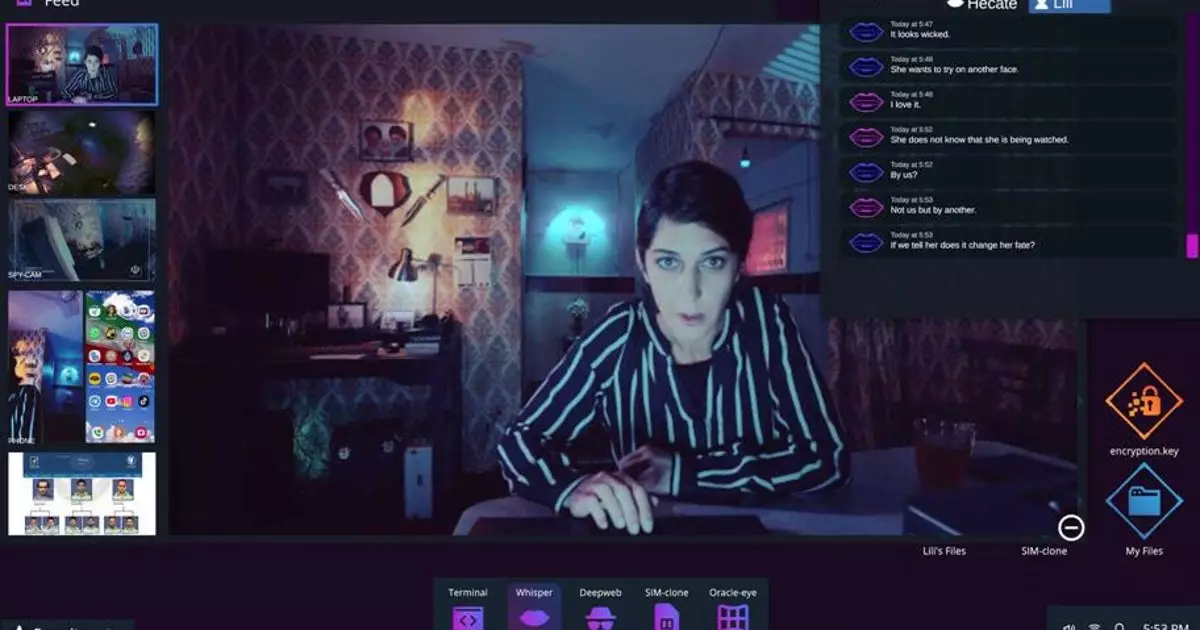In an unprecedented collaboration, the Royal Shakespeare Company (RSC) has taken an innovative leap to merge classical literature with contemporary interactive gaming. The project in question is an adaptation of Shakespeare’s iconic play “Macbeth,” but with a distinctive twist; players will experience the story through the lens of Lady Macbeth’s digital world. This fresh perspective acknowledges not just the relevance of the narrative but also the media’s evolution, highlighting the fact that video games have emerged as a viable platform for storytelling, perhaps even more adaptable than traditional theatre.
The adaptation, titled “Lili,” draws inspiration from the interactive drama framework used in popular titles like Sam Barlow’s “Her Story” and “Telling Lies.” However, “Lili” aims to elevate this foundation by situating the familiar themes of ambition, power, and guilt within the socio-political landscape of modern Iran. By reimagining the witches of “Macbeth” as hackers, the narrative invokes a sense of urgency and relevance, echoing contemporary issues such as surveillance, authoritarianism, and the struggle for personal agency. In an era where privacy is becoming increasingly elusive, the game invites players to navigate these complexities, compelling them to confront the moral ambiguities that the original play also grapples with.
An Interactive Experience Steeped in Culture
The game is set to offer a blend of live-action cinema and interactive gaming elements, allowing players to fully immerse themselves in Lady Macbeth’s world. This integration of formats is not merely a gimmick but a thoughtful approach to storytelling, enabling a dynamic engagement that traditional theatre may struggle to achieve. RSC described the gameplay as a way to make choices that significantly affect Lady Macbeth’s destiny, reinforcing the idea that the player’s interaction lends agency to the character in a way that the linear narrative of theatre cannot.
What’s particularly exciting about this project is the talent behind it. Collaborating with the New York-based studio iNK Stories, known for their successful game “1979 Revolution: Black Friday,” the RSC appears to be strategically aligning itself with a team that not only understands the gaming landscape but also has experience in tackling historical and culturally resonant themes. The involvement of Zar Amir, a well-regarded actress known for her compelling portrayal of challenging roles, adds a layer of authenticity and depth. Her personal experiences as an Iranian woman facing gendered oppression can significantly enrich the narrative, offering a nuanced layer that British or American adaptations might lack.
While “Lili” is set to join the growing ranks of narrative-driven games, it stands out due to its explicit connection to a classic text. While other games have tackled contemporary issues, few have had the ambition to retell Shakespeare through such an interactive format. Titles like “Orwell” and “Hypnospace Outlaw” may have explored themes of surveillance and social dynamics, but “Lili” seeks to harness the emotional weight and complexity of Shakespeare’s characters while immersing players in a visual and narrative style that is both relevant and engaging.
The project raises intriguing questions about the future of storytelling. Will interactive adaptations of classical literature become a norm in the creative landscape, further dissolving the boundaries between genres? Will audiences, particularly younger ones, find new appreciation for Shakespeare through the medium of video games? The venture could well serve as a litmus test for the acceptance of video games as a legitimate form of storytelling akin to films and theatre.
Looking Ahead: The Future of Literary Adaptations
Despite the game’s expected release in late 2025, already the buzz surrounding “Lili” points to a future where interactive narratives reshape how we experience stories. As the Royal Shakespeare Company embraces video games as an art form, there is potential not only for expanding the audience of Shakespeare’s works but also for challenging the very essence of storytelling itself. The intersection between interactive media and literature opens doors for endless possibilities, inviting players to explore not just Shakespeare’s world but the broader complexities of the human experience. In many ways, “Lili” stands as a testament that creativity knows no confines, urging us to reconsider what constitutes a profound narrative.

